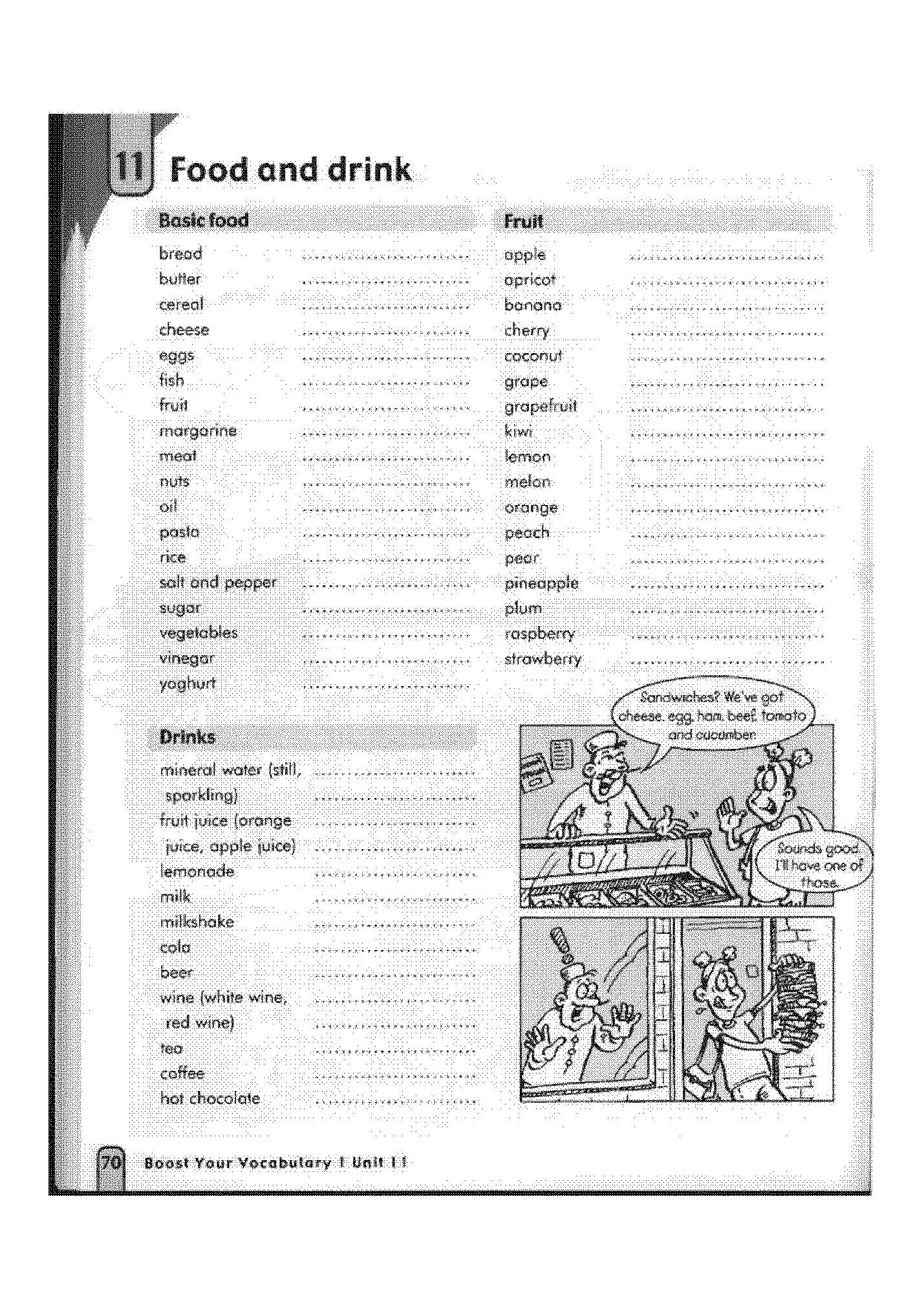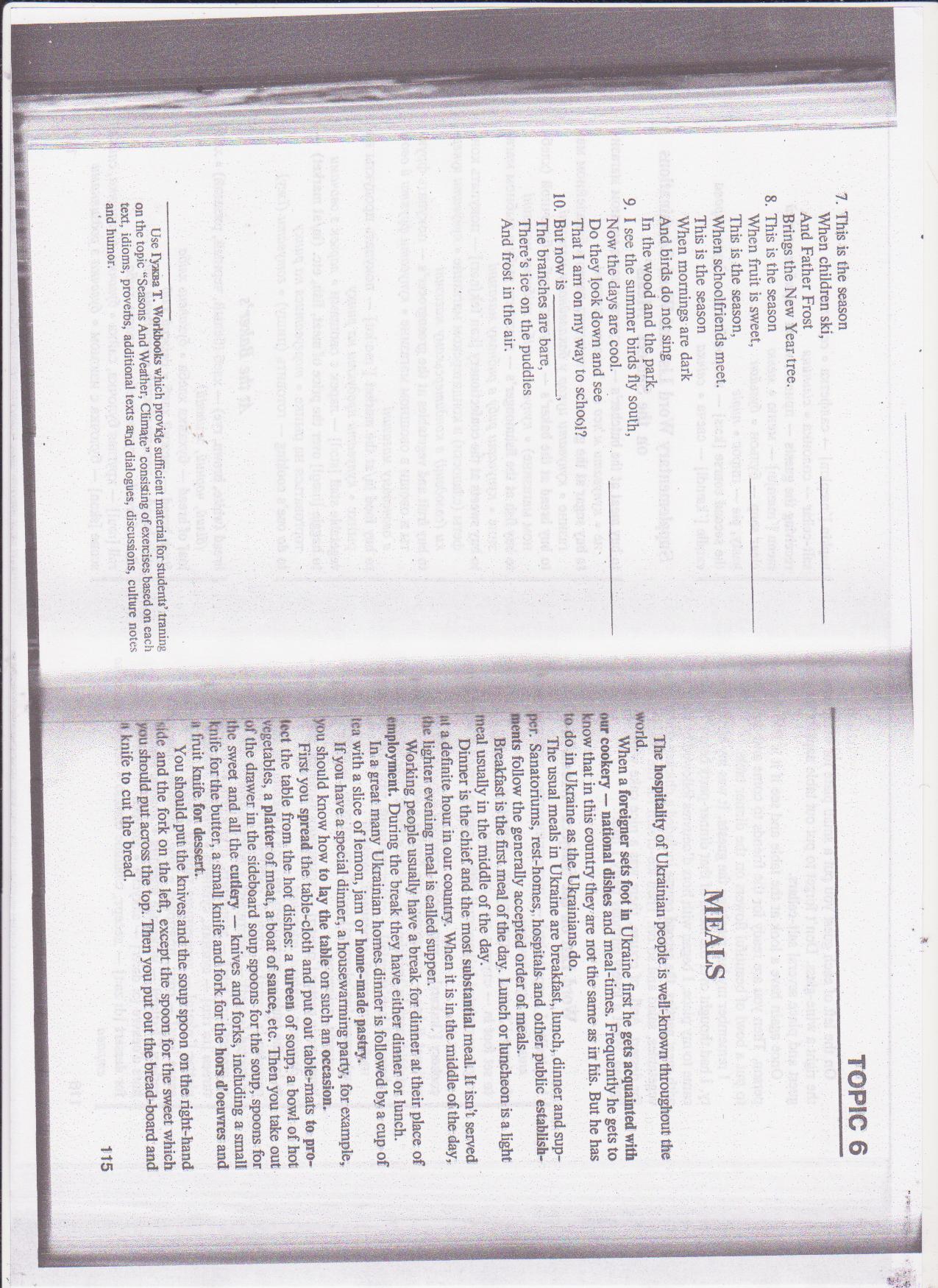
- •Vocabulary
- •Vegetables:
- •Vocabulary
- •Verbs Food
- •Vocabulary
- •Vocabulary
- •Vocabulary
- •Table manners post-test Mark statements t (for true), f (for false)
- •Vocabulary
- •Down on 2) useful 3) products 4) fruit 5) salt 6) consist 7) minerals 8) butter 9) cheaper
- •Vocabulary
- •Is fast food bad?
- •Vocabulary
- •Vocabulary
- •Vocabulary
- •Vocabulary
Заняття №10
Різноманіття продуктів харчування (продукти рослинного походження). Прикметник
Vocabulary
Fruits:
apple, apricot, pear, plum, peach – яблуко, абрикос, груша, слива, персик
cherry, grapes, banana, orange, pineapple – вишня, виноград, банан, апельсин, ананас
tangerine, lemon, pomegranate, kiwi – мандарин, лимон, гранат, ківі
melon, water melon, grapefruit – диня, кавун, грейпфрут
Vegetables:
tomato, cucumber, carrot, potato – помідор, огірок, морква, картопля
radish, egg-plant, beet, beans, cabbage – редиска, баклажан, буряк, квасоля, капуста
lettuce, garlic, onion, cauliflower, parsley, pumpkin – листя салату, часник, цибуля, цвітна капуста, петрушка, гарбуз
Berry:
strawberry, raspberry – полуниця, малина
blackberry, currant – чорниця, смородина
Drinks:
hard drinks, soft drinks – алкогольні, безалкогольні напої
tea, black coffee, white coffee – чай, чорна кава, кава з молоком
juice, cocktail, mineral water – сік, коктейль, мінеральна воді
on the rocks – із льодом
wine (white, red, dry), brandy, champagne, vodka – вино (біле, червоне, сухе), коньяк, шампанське, горілка
to prefer – надавати перевагу
cereal, noodles, salad –крупа, локшина, салат
to have a snack –перекусити
the canteen – їдальня
the first course – перша страва
the main course – головна страва
dish – страва, блюдо
bread, butter, cheese, egg, sugar, salt – хліб, масло, сир, яйце, цукор. сіль
Exercise 1: Read and translate text:
I prefer to have meals at home. At the weekend I like to get up late and have a good breakfast of omelette, pancakes, or cereal or noodles or something like that. I like fruits for breakfast very much. I prefer apples, pears, grapes, banana and grapefruit, although it is very sour. I have a cup of strong tea or black coffee and a couple of sandwiches. I like sandwiches with a lot of vegetables: tomatoes, cucumbers, cabbages or even onion.
As I spend a lot of time at college (usually eight or nine hours) it's necessary to have a snack at midday. That's why I have to go to the canteen to have lunch. There are a lot of dishes in our canteen. It has become a tradition with our canteen to have mashed potatoes every day with a glass of juice and a lot of fruits.
But I enjoy my evening meal at home as I said.
To begin with, I like salads – tomato and cucumber salad or mixed salad where there are a lot of potatoes, radish, tomatoes and egg-plants. For the first course in our canteen we have soup. For the main course we have meat, or fish dishes. We also have a lot of vegetables — green peas, carrots, tomatoes, cucumbers.
For dessert we have some fruit, fruit juice or just a cup of tea with a slice of cake.
On Sundays I like to go to McDonald's with my friends. I like everything there: cheeseburgers, hamburgers and Big Macs, apple pies and fruit cocktails. But unfortunately we can't go there very often, because it's not healthy to eat such food.
Exercise 2: Complete the sentences:
I prefer to have meals at … \ in …
I like to have breakfast of …
I like such fruits for breakfast as … very much.
I have a cup of strong tea …
I like sandwiches with …
There are a lot of dishes in our canteen. They are:
I like salads with …
For the first course I like …
For the main course I like …
For dessert I prefer …
My favourite fruit is …
I like such drinks as …
Exercise 3: Answer the questions:
What time do you get up?
Do you have enough time for breakfast? What do you eat for breakfast?
What is your favourite dish?
What fruits do you know?
What fruit do you like most of all?
What berries do you know?
What vegetables do you like?
What do you usually drink?
What is your first course?
What is your main course?
What you like to eat for dessert?
Do you like salads?
What do you prefer: cereal or noodles?
What is your ideal food? What is it?
Exercise 4: Read some facts about different fruits and vegetables:
In China, apricots grew 4000 years ago and peach over 2000 years ago.
It is not known for sure where the lemon originated but India, Burma and southern China are the most likely places.
Pears grew wild in Britain.
Greece is one country where olives first grew.
Pineapples are native to Brazil.
Cauliflower comes from China, where they were about the size of a cricket ball.
Carrots are one of the world's most popular vegetables. But did you know that until about the 1600s carrots were purple?
Onions were grown in the Middle East thousands of years ago and slaves, building the pyramids in ancient Egypt ate onions, garlic and radishes.
Potatoes originated in South America and were taken to England and Europe by explorer Francis Drake in the 1500s. At first people in England and Europe didn't eat the potatoes, they just grew the plant because they thought it looked pretty!
Tomatoes come from South America and Spanish explorers took them to Europe in the 1500s.
What facts did you know?
What is the most interesting information for you?
Which information is unimportant for you?
Exercise 5: Questions to the text «Food Around The World»
What factors does the food depend on?
In what country the rice and noodle are eaten most of all?
In what country herrings and sardines are eaten most of all?
What do people from central Europe eat?
What about German and Poland?
How many courses do American and European people eat with knives and forks? What about Chine and India?
Is it possible nowadays to transform food very easy? Why?
What is the origin (походження) of banana, rice, strawberry?
Is the question of food a problem nowadays? Do all countries have enough food?
Grammatical Topic
THE ADJECTIVE (Прикметник)
Прикметники в англійській мові не змінюються ні за числами, ні за родами, ні за відмінками: a round table – круглий стіл, round tables – круглі столи. Прикметники змінюються лише за ступенями порівняння: основна форма прикметника, вищий ступінь порівняння прикметника та найвищий ступінь порівняння прикметника.
Форми вищого і найвищого ступенів порівняння прикметників можуть бути простими та складеними. Прості форми утворюються за допомогою додавання закінчення –er у вищому ступені порівняння прикметників та –est у найвищому + артикль the: cold –colder – the coldest - холодний – холодніший – найхолодніший. Складені форми ступенів порівняння прикметників утворюються додаванням до основної форми прикметника слова more – більш у вищому ступені та most – найбільш у найвищому + артикль the: dangerous – more dangerous – the most dangerous - небезпечний – небезпечніший або більш небезпечний – найнебезпечніший або найбільш небезпечніший.
Прості форми ступенів прикметника мають:
а) усі односкладові прикметники:
short – shorter –the shortest
б) двоскладові прикметники, що закінчуються на –y, er, le, ow:
heavy – heavier – the heaviest
clever – cleverer – the cleverest
simple – simpler – the simplest
в) двоскладові прикметники з наголосом на другий склад:
polite – politer – the politest
Якщо прикметник закінчується на німе –е, то пере закінченням –er та est воно випадає: large –larger – the largest
Якщо односкладовий прикметник закінчується однією приголосною з попереднім голосним, то така кінцева приголосна перед закінченням –er та est подвоюється: hot – hotter – the hottest, big – bigger – the biggest
Якщо прикметник закінчується буквою –y з попередньою приголосною, то перед закінченням –er та est –y змінюється на –i: dry – drier – the driest
Складені форми ступенів прикметника мають усі багатоскладові прикметники (більше двох складів) та двоскладові прикметники з наголосом на першому складі, крім тих, що закінчуються на –y, er, le, ow: difficult – more difficult – the most difficult
Exercise 1: Make the right degrees of comparison (Утворіть правильний ступінь порівняння прикметників):
Short, long, dirty, clean, dark, light, thin, cold, dry, silly, tall, strong, happy.
Beautiful, great, large, brave, cheap, pretty, careful, stupid, barrow, young.
Rich, interesting, expensive, quick, easy, rude, cheerful, fast, lazy.
Exercise 2: Open the brackets: (Розкрийте дужки):
The rooms are (clean) than they used to be.
It’s (cold) here than in Kyiv.
This is (expensive) book of them all.
This is (interesting) film of them all.
The Nile is (long) than Dnipro.
These people are (polite) than in my town.
Is Michael (intelligent) than Susan?
What is the name of the (high) mountain in Europe?


Заняття №11
Різноманіття продуктів харчування (продукти тваринного походження). Прикметник
